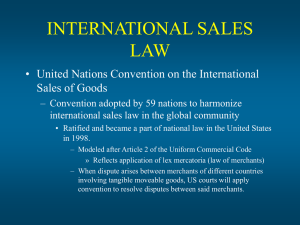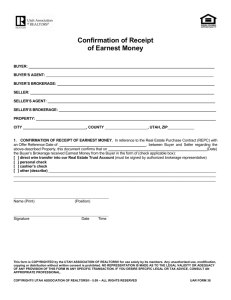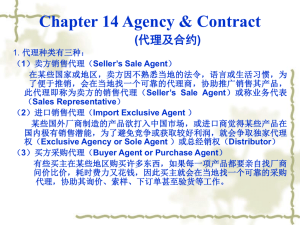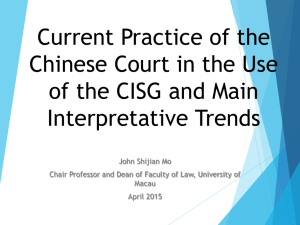Haaga-Helia INTERNATIONAL BUSINESS LAW
advertisement
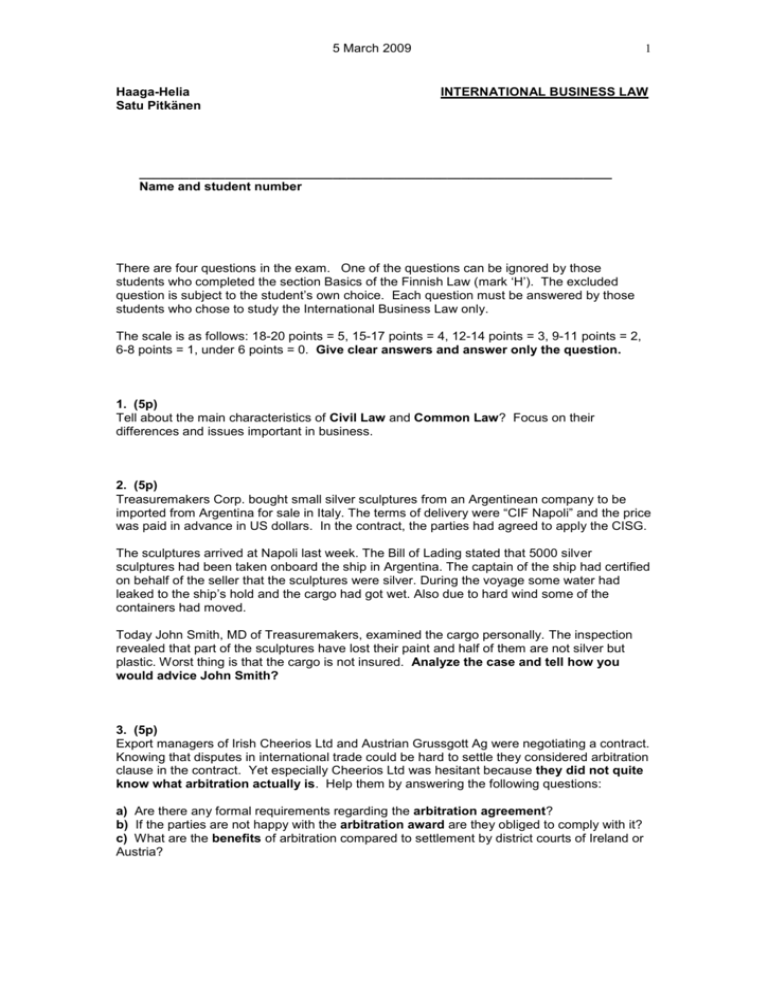
5 March 2009 Haaga-Helia Satu Pitkänen 1 INTERNATIONAL BUSINESS LAW __________________________________________________________________ Name and student number There are four questions in the exam. One of the questions can be ignored by those students who completed the section Basics of the Finnish Law (mark ‘H’). The excluded question is subject to the student’s own choice. Each question must be answered by those students who chose to study the International Business Law only. The scale is as follows: 18-20 points = 5, 15-17 points = 4, 12-14 points = 3, 9-11 points = 2, 6-8 points = 1, under 6 points = 0. Give clear answers and answer only the question. 1. (5p) Tell about the main characteristics of Civil Law and Common Law? Focus on their differences and issues important in business. 2. (5p) Treasuremakers Corp. bought small silver sculptures from an Argentinean company to be imported from Argentina for sale in Italy. The terms of delivery were “CIF Napoli” and the price was paid in advance in US dollars. In the contract, the parties had agreed to apply the CISG. The sculptures arrived at Napoli last week. The Bill of Lading stated that 5000 silver sculptures had been taken onboard the ship in Argentina. The captain of the ship had certified on behalf of the seller that the sculptures were silver. During the voyage some water had leaked to the ship’s hold and the cargo had got wet. Also due to hard wind some of the containers had moved. Today John Smith, MD of Treasuremakers, examined the cargo personally. The inspection revealed that part of the sculptures have lost their paint and half of them are not silver but plastic. Worst thing is that the cargo is not insured. Analyze the case and tell how you would advice John Smith? 3. (5p) Export managers of Irish Cheerios Ltd and Austrian Grussgott Ag were negotiating a contract. Knowing that disputes in international trade could be hard to settle they considered arbitration clause in the contract. Yet especially Cheerios Ltd was hesitant because they did not quite know what arbitration actually is. Help them by answering the following questions: a) Are there any formal requirements regarding the arbitration agreement? b) If the parties are not happy with the arbitration award are they obliged to comply with it? c) What are the benefits of arbitration compared to settlement by district courts of Ireland or Austria? 5 March 2009 2 4. (5p) There is only one correct option in each question, choose the one and circle its number: a. The United Nations Convention on Contracts for the International Sale of Goods (CISG; Vienna Convention) 1. 2. 3. 4. Is never applied to consumer trade Is always applied to business-to-business trade Can be opted in and out (excluded and included) Is always applied to international business-to-business trade b. Under the CISG, trade practice 1. 2. 3. 4. Is always ignored Must always be considered as part of the contract Is not considered as part of the contract even if widely known Can be considered as part of the contract if widely known c. Under the CISG, 1. 2. 3. 4. Offer is never binding Contract is binding only when it is in signed writing Buyer can avoid the contract always if the goods are defective Goods damaged while in transit must be paid by the buyer, if risk has passed c. Choose the correct argument 1. “Forum non conveniens”- principle means that the contracting parties may have to compromise their choice of the forum state 2. Under the CISG, the parties have no duty to mitigate each other’s losses 3. The CISG has various provisions about voidability and incompetence 4. Incoterms are part of the CISG d. Bill of Lading 1. 2. 3. 4. Is a method of payment used often in international trade Is a document given by the carrier as a receipt of goods in sea transportation Is never used in connection with a Letter of Credit Is a document used commonly in all means of international transportation PLEASE RETURN ALL PAPERS - THANK YOU! 5 March 2009 3 Answers / International law, 14 Nov 2007 1. Civil Law: - based on written law - Germanic system: general, abstract legislation => courts apply in each case - Romanic system: detailed legislation => the answer to each case should be found straight in the statutes - Goal is the consistency and uniformity of enforcement predictability Common Law: - focuses on individual cases - previous cases as precedents for latter cases - low degree of written law not predictable, lack of consistency and uniformity contracts must be long and detailed to cover all the necessary issues 2. 1) The contracting parties may include standard contract terms as part of the contract. CIF: Cost, Insurance and Freight until the destination are paid by the seller, risk passes to the buyer when the goods cross the ship’s rail in the port of shipment. In this case the seller breached his duty to take insurance on behalf of the buyer. => Breach of contract => buyer can claim damages (for example compensation for the transportation damages which the insurance would have covered) 2) Buyer’s responsibility is to examine the goods as soon as is practicable. Arrival last week, examination today – timely? Under the CISG, the buyer has to • Examine the goods as soon as is practicable after delivery • Give notice of defect to the seller within a reasonable time • Give notice of a claim within a reasonable time 3) In the case the buyer has two claims: 1) Goods are not in conformity with the contract (50% not silver) The seller is liable for any lack of conformity which exists at the time when the risk passes to the buyer, even though the lack of conformity becomes apparent only after that time risk passed when the goods crossed the ship’s rail (CIF) whether or not they conformed with the contract then, was crucial Normally, a cursory inspection by the carrier would be adequate. In this case the carrier, commissioned by the seller, had inspected the goods and certified in the B/L that the sculptures were of silver. either the inspection was not undertaken properly, the certificate was fraud or 50% of the sculptures were exchanged after the inspection 5 March 2009 4 If the buyer can prove that the goods were not conforming with the contract at the time when the risk passed (contrary to the inspection), he can claim for remedies (substitute goods, reduction of price, even avoidance since the breach obviously can be considered fundamental) and damages (lost profits, price difference if buying substitute goods from somewhere else etc.) 2) Part of the goods were damaged during the transportation The carrier’s responsibility is normally limited to the seaworthiness of the ship, proper and careful loading, handling, stowing, carrying, keeping, caring for and discharging the goods. The carrier is liable for damages caused to the cargo during the voyage • leak > wet cargo > lost paint • not properly keeping and caring > moving of the cargo Since risk had passed, it is up to the buyer to claim damages from the carrier. If the damage was due to inadequate packaging, the seller is liable for the goods not conforming with the contract (see above point 1). 3. a) A written Arbitration Agreement is needed to oblige the parties to use arbitration in case of a dispute. b) An arbitration award is final, the parties can’t apply to a court to change it (unless they have managed the procedure incorrectly). Enforcement is done by national courts if one of the parties refuses to comply. Over 70 signatories of New York Convention have agreed to enforce international arbitration awards. c) Benefits: Safe (expertise), easy, secret, final, judgment universally enforceable (New York Convention signatories). (Defects: Costly, time consuming, final) 4. a: 3, b: 4, c: 4, d: 1, e: 2

